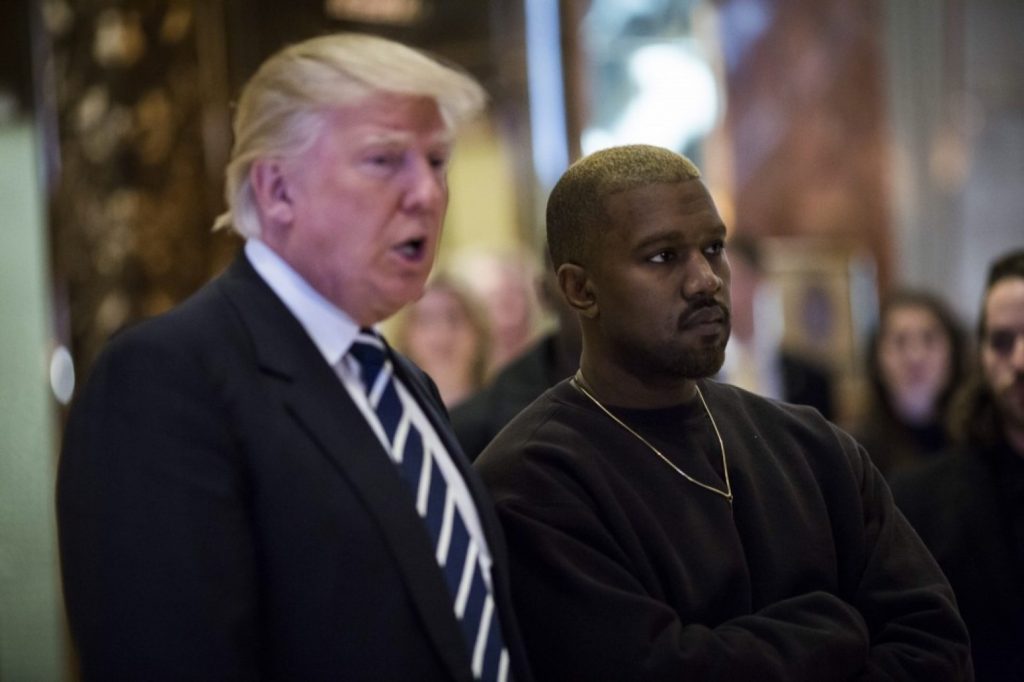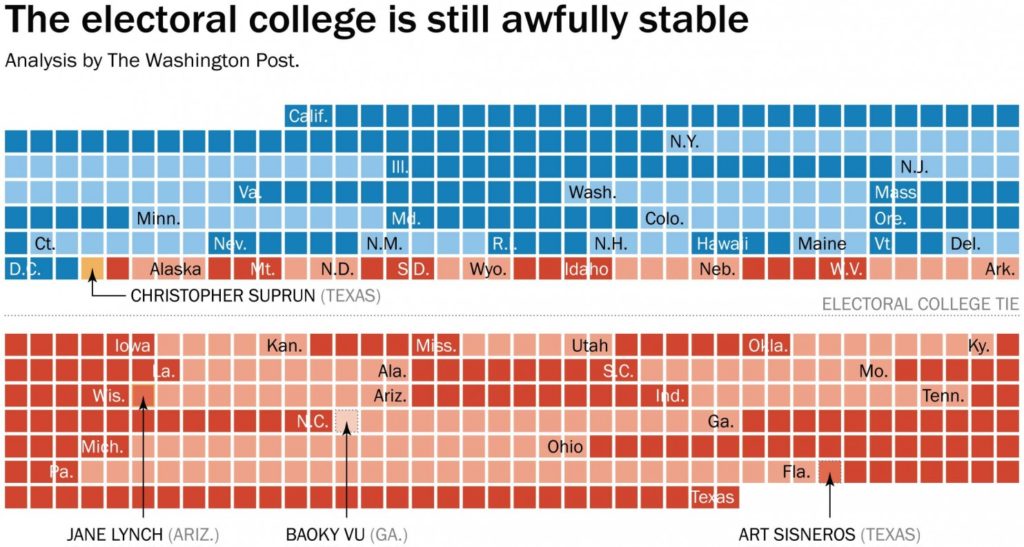By Philip Bump
The Washington Post

Donald Trump and Kim Kardashian’s husband meet in New York on Tuesday. (John Taggart/Bloomberg via EPA)
There’s a guy who has been emailing me every night for the past few nights pointing me to Medium posts that he has written about how he’s a sworn Donald Trump elector, pledged to cast a vote for the Republican candidate when electors vote next week, but will do no such thing. He, like others who purport to be in the same situation, cloaks that claim in the language of the Founding Fathers. He, like others who purport to be in the same situation, offers no proof that he is an elector, much less an elector committed to Trump who will bail on that duty.
A subset of Democrats frustrated at the surprising outcome of the 2016 presidential election have for some time tried to figure out how the electoral college might intervene on their behalf to hand the presidency to Hillary Clinton — or, at least, not hand it to Trump. As you may remember from high school civics class (or from reading the news in the past month), it’s not the votes of individuals that dictate who will be the next president, it’s the vote of those 538 electors, who are assigned by the results of the popular vote.
Trump has 36 more electors than he needs to be the next president: He has 306 committed and needs 270. (At 269, the race is decided by the House.) So there would need to be 37 people like my anonymous emailer to flip the vote. There’s already one, as we noted last week, an elector named Chris Suprun from Texas. One wobbly elector in Arizona recommitted to Trump, and others in Georgia and Texas plan to resign rather than vote for the Republican. They’ll be replaced.

(Philip Bump / The Washington Post)
All of those red boxes above the dotted line would need to flip to change the results.
To accomplish that, a number of people have taken to contacting the known electors and begging them to change their votes. A group called “Hamilton Electors” allows visitors to its website to “get involved” — through candlelight vigils, according to the calendar of upcoming events. At the risk of sounding cynical, that may not get the job done.
How the electoral college works
Why “Hamilton Electors”? Because Hamilton, ever in vogue in 2016, is the author of Federalist #68, one of the missives written before the finalization of the Constitution that served as a sort of discussion board for what the American experiment might look like. Those hoping to flip those red squares have pointed to #68’s description of outside influence in elections . ..
These most deadly adversaries of republican government might naturally have been expected to make their approaches from more than one quarter, but chiefly from the desire in foreign powers to gain an improper ascendant in our councils. How could they better gratify this, than by raising a creature of their own to the chief magistracy of the Union?
. . . and to its description of a presidential candidate lacking qualifications.
The process of election affords a moral certainty, that the office of President will never fall to the lot of any man who is not in an eminent degree endowed with the requisite qualifications. Talents for low intrigue, and the little arts of popularity, may alone suffice to elevate a man to the first honors in a single State; but it will require other talents, and a different kind of merit, to establish him in the esteem and confidence of the whole Union . ..
An intermediary body like the electoral college, the document suggests, is a way of avoiding those problems.
And, lo, we got us some anecdotes.
Former secretary of labor Robert Reich Facebook-reported that three electors had called him and said they thought Trump shouldn’t get the majority of the votes; those electors, Reich says, had talked to other electors and it’s faithless electors all the way down. He notes that it’s unlikely Trump won’t win the necessary votes, but: What if! (Reich also had a mole in the White House who told him the wrong name for President Obama’s Supreme Court replacement for the late Justice Antonin Scalia, for what it’s worth.)
Harvard lawyer turned political-man-about-town Lawrence Lessig is part of a group of attorneys offering free legal advice to electors who want to bail (since, in some states, voting contrary to the dictates of the popular vote violates the law). Lessig claims to have heard from 20 electors who are willing to bail on Trump — though, as Politico noted in its report, he offered no evidence to that end.
The way it works is that electors will meet in their states and cast their votes for president and vice president. They really can vote for whomever they wish; even those state laws mandating a pick would probably not hold up if challenged at the Supreme Court. But the political parties aren’t stupid. Many of the electors who make the cut are people with some tie to party politics, and a guy who works for the Republican Party isn’t likely to walk past a candlelight vigil of Clinton supporters and suddenly waver.
Politico also documented how the party is making double sure that no one goes south, deploying a deliberate outreach effort to keep people in line. They’ve ID’d one balky elector: Chris Suprun.
Weirdly, the heavily performative “all the polls were wrong!” response to the year’s popular vote outcome leaves us in a place where we have no solid data suggesting what will happen next week, just anecdotes from parties interested in particular outcomes. The smart money (and history) are with the GOP description of what will happen: Trump will win the presidency with one or very, very few defectors. But we don’t know this, technically speaking.
Giving space for random people like my emailer to try to get press by claiming to be a sleeper-cell elector ready to flip when the moment arrives. And, I guess, for that strategy to work.
___
http://www.washingtonpost.com/news/the-fix/wp/2016/12/14/donald-trump-will-face-one-some-or-20-faithless-electors-depending-on-what-random-story-you-read/?utm_term=.12e37f328096


